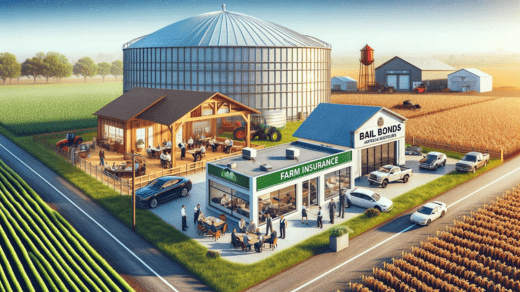Farmers face numerous risks every day, from unpredictable weather patterns to market fluctuations. These uncertainties can significantly impact their livelihoods and financial stability. To mitigate these risks, farmers often turn to farm insurance. In this article, we will delve into the world of farm insurance, exploring its importance, coverage options, and benefits.
Why Farm Insurance Matters?
Farm insurance plays a crucial role in safeguarding agricultural investments. It provides financial protection against various perils that can threaten farm operations. Whether it’s damage to crops, livestock losses, or liability issues, farm insurance offers peace of mind to farmers, allowing them to focus on their core activities without worrying about unforeseen setbacks.
Types of Farm Insurance
- Crop Insurance: Crop insurance protects farmers against losses due to natural disasters, such as droughts, floods, or hailstorms. It provides coverage for the cost of replanting, lost revenue, and other related expenses.
- Livestock Insurance: Livestock insurance covers losses resulting from disease, accidents, or theft. It helps farmers recoup the value of lost animals, ensuring continuity in livestock operations.
- Property Insurance: Property insurance safeguards farm buildings, equipment, and machinery against damages caused by fire, vandalism, or other covered perils. It ensures that farmers can repair or replace essential assets without bearing the full financial burden.
- Liability Insurance: Liability insurance protects farmers against legal claims arising from third-party injuries or property damage that occur on their premises. It covers legal expenses, settlements, and judgments, shielding farmers from potentially crippling lawsuits.
Benefits of Farm Insurance
- Financial Security: Farm insurance provides a safety net against unexpected losses, allowing farmers to recover swiftly without depleting their savings or assets.
- Risk Management: By transferring risks to insurance providers, farmers can better manage uncertainties and focus on optimizing their operations for long-term success.
- Business Continuity: In the event of a disaster or unforeseen event, farm insurance helps ensure business continuity by covering the costs of repairs, replacements, and other necessary expenses.
- Peace of Mind: Knowing that their investments are protected, farmers can operate with confidence, even in the face of challenging circumstances.
Understanding Coverage Options
When selecting farm insurance coverage, it’s essential to consider factors such as the size of the operation, types of crops or livestock, geographical location, and specific risk exposures. Insurance policies can be tailored to meet the unique needs of each farm, providing customized protection against identified risks.
The Role of Bail Bonds in Farm Insurance
In some cases, farmers may find themselves in legal trouble, such as disputes with suppliers, contractors, or even law enforcement issues. Bail bonds can be an essential component of farm insurance, providing the funds necessary to secure the release of individuals detained pending trial. By offering bail bond services as part of their insurance packages, insurers further support farmers during challenging times, ensuring that legal matters do not disrupt farm operations.
Conclusion
Farm insurance is a vital tool for protecting agricultural investments and ensuring the long-term viability of farm operations. By understanding the various types of coverage available and selecting policies tailored to their specific needs, farmers can mitigate risks and navigate uncertainties with confidence. With farm insurance in place, farmers can focus on what they do best: feeding the world.
Incorporating bail bonds into farm insurance offerings further enhances the support provided to farmers, addressing legal challenges and promoting business continuity. As farming continues to evolve in the face of changing landscapes and emerging risks, farm insurance remains a cornerstone of financial stability and resilience in the agricultural sector.

